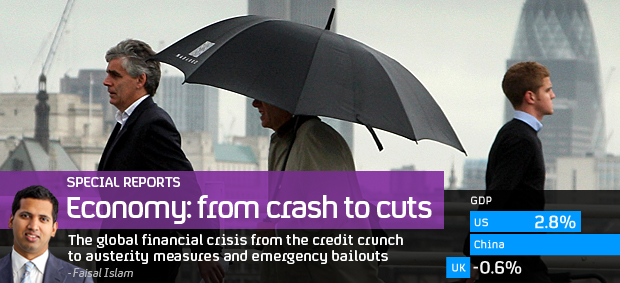Coalition has ‘cast us aside’, say jobless women
 Jackie Long
Social Affairs Editor and Presenter
Jackie Long
Social Affairs Editor and Presenter
As the latest unemployment figures are released, Social Affairs Editor Jackie Long looks at one group of people who seem to be particularly badly affected – women.
As the latest unemployment figures are released, one group can be sure of the government’s attention. Women. A growing army of them are joining the dole queues – and their disaffection with the coalition is also growing.
Anxious about negative poll ratings among women, the government has put the Home Secretary Theresa May in to bat. Also the women’s minister, she’s promised to tap into the “true potential” of Britain’s out-of-work women. She says it’s worth £21bn to the economy.
But when we went to the north east to meet some of the women who have lost their jobs this year, they certainly were not feeling that “they’re worth it.”
“I find it really demeaning and really degrading going into the benefit office,” said Michelle Pattinson.
I applied for a job at the local supermarket and I was rejected and I think: ‘Why? Why am I not getting a job like that, that I know I can do?’ It’s frustrating. Michelle Pattinson
“I feel kind of worthless.”
Michelle used to work helping the unemployed get back into work, until she lost her own job six months ago. She is a single mother whose youngest son is five years old. The government has made much of the fact it believes women like her should be working. And Michelle agrees – indeed she could be speaking for the government when she talks about how important it is for her son to see her work, to understand the importance of a work ethic.
Where she is less clear, is what she is supposed to do when she simply can’t find a job.
“I applied for a job at the local supermarket and I was rejected and I think: ‘Why? Why am I not getting a job like that, that I know I can do?’ It’s frustrating. Really, really sad,” she said.
Read more: Total unemployment figure worst since 1994
Numbers stacked against women
The problem for Michelle is that the numbers are just stacked against her. She lives in Ashington, a colliery town in Northumberland, which has struggled to fight back after the mines closed almost three decades ago.
But where once the town depended on coal, it grew to rely on the public sector. It accounts for a massive fifty per cent of the jobs here, the majority of them taken by women.
More than 1,300 jobs have been lost in the last year – 90 per cent of them women. And all of this is against a backdrop of regional unemployment of nearly 10 per cent – the highest in the country.
The think tank IPPR North, predicts women’s unemployment can only rise further as the full extent of public sector job cuts hits home. This is grim news for women who are already searching for work in an increasingly competitive market.
Cast aside?
Sue McKay is 59. She began working when she was just 16 and never stopped. Until now. A skilled, experienced administrator, she lost her job more than six months ago.
Sue has applied for 96 jobs in that time, all the while claiming Jobseeker’s Allowance. After six months, JSA becomes means-tested. With just over £16,000 in savings, she has crossed the threshold for help and is no longer entitled to any benefits.
Effectively, she now must live on the money she has saved for her retirement until she can draw her pension in three years’ time. A lifetime spent as a good citizen – working and saving for her old age – has left her, she says, with very little.
“I don’t think the system is helping me at all,” she said.
“I think they’ve cast me aside now. ‘Go away and live on your savings and don’t bother us any more.’ I’ve become an invisible woman really.”
Her early confidence is fading and she can barely contemplate what she knows is a growing possibility.
“The older I get and the further I move away from the job scene…I’m beginning to wonder if I’ll ever work again. I do hope so.”
